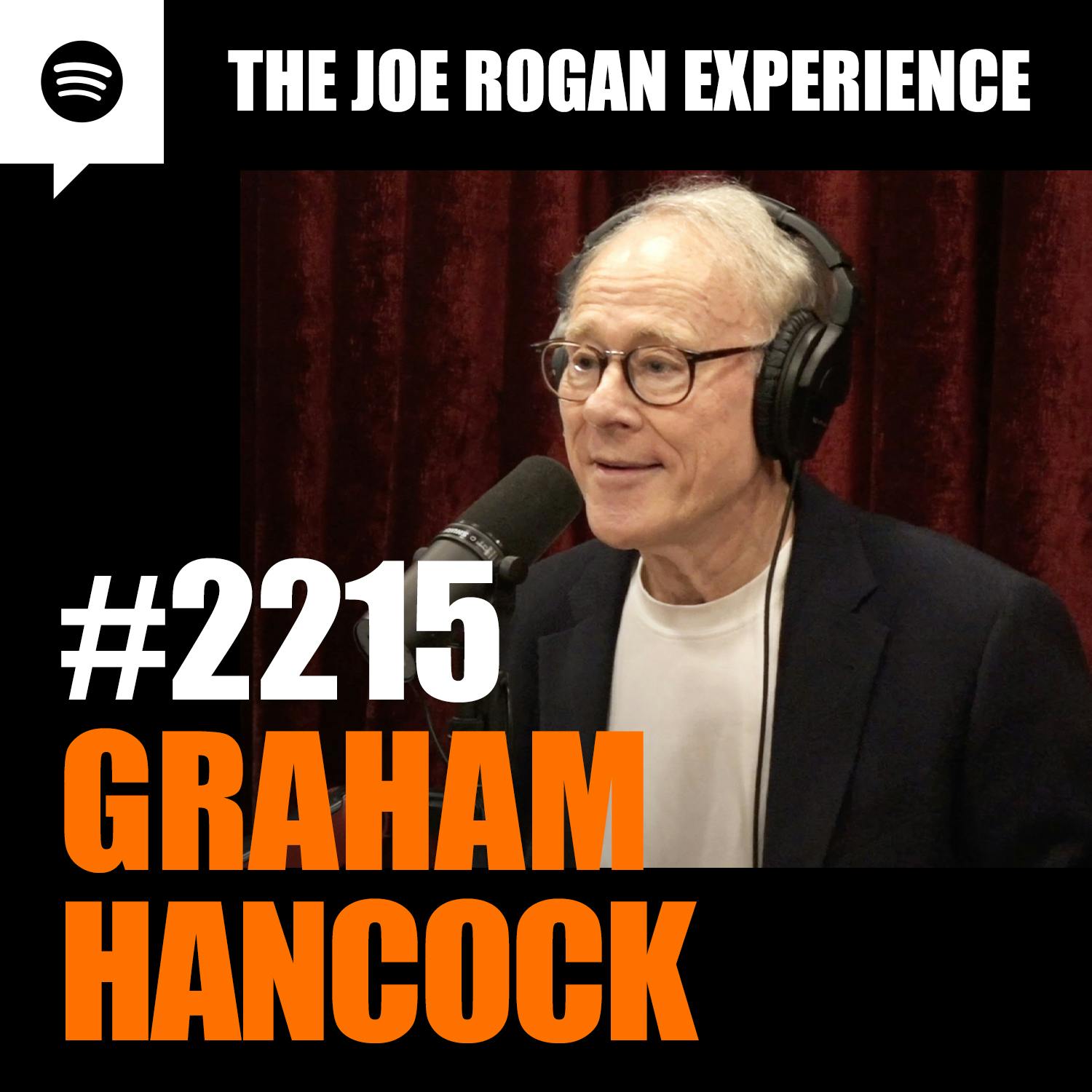
#961 - Graham Hancock, Randall Carlson & Michael Shermer
Graham Hancock is an English author and journalist, well known for books such as "Fingerprints Of The Gods" & his latest book "Magicians of the Gods". Randall Carlson is a master builder and architectural designer, teacher, geometrician, geomythologist, geological explorer and renegade scholar. Michael Shermer is a science writer, historian of science, founder of The Skeptics Society, and Editor in Chief of its magazine Skeptic.
Episodes with Graham Hancock
Related Episodes
Categories
Key Takeaways
The comet impact theory could explain rapid climate changes and extinctions.
This theory challenges traditional views of gradual climate change as the sole factor.
Alternative archaeology is often dismissed by mainstream science.
This highlights the tension between established scientific views and emerging theories.
Skepticism helps to validate or challenge scientific theories.
This encourages rigorous examination of claims and strengthens scientific discourse.
Patternicity influences belief systems and interpretations of historical events.
Understanding this can prevent misinterpretation of data and promote critical thinking.
Gobekli Tepe's existence challenges previous understandings of ancient societies.
It suggests that sophisticated architectural achievements were possible much earlier than believed.
Watch the full episode of #961 - Graham Hancock, Randall Carlson & Michael Shermer.
Episode Timestamps
Exploring the Comet Impact Hypothesis and Its Implications
- Michael Schirmer and Randall Carlson discuss the comet impact theory's significance.
- Recent findings suggest a comet may have triggered mass extinction events.
- Theories of climate change and human involvement in extinctions are debated.
Exploring Patterns in Science and Skepticism
- Skepticism is essential in evaluating scientific hypotheses and patterns.
- Alternative theories often arise from perceived patterns in historical phenomena.
- Debate exists on the interpretation of anomalies in scientific data.
Exploring the Mysteries of Gobekli Tepe and Ancient Civilizations
- Gobekli Tepe predates Stonehenge by 7,000 years, challenging historical narratives.
- Archaeologists' assumptions about hunter-gatherers' capabilities are being reconsidered.
- The idea of lost civilizations raises intriguing questions about ancient technological advancements.
Exploring Human Ingenuity and Ancient Civilizations
- Discussion highlights the sophistication of ancient human achievements like Göbekli Tepe.
- Challenges mainstream archaeology's view on hunter-gatherers and their capabilities.
- Speculates on the possibility of lost civilizations influencing ancient structures.
Exploring Ancient Structures and Human Intelligence
- Discusses the monumental task of moving large stones without modern technology.
- Examines the implications of climate changes on ancient human endeavors.
- Considers the intelligence required to create megalithic structures like Gobekli Tepe.
Debate on Shamanism, Civilization, and Historical Theories
- Discussion centers on the connection between cave art and shamanistic practices.
- Contrasting views on Gobekli Tepe's origins ignite academic debate.
- Criticism of mainstream scientific perspectives and alternative theories is highlighted.
Exploring Lost Civilizations and Mainstream Academia's Response
- Discussion centers on the existence of lost civilizations and their influence.
- Criticism of mainstream academia's dismissive attitude towards alternative theories.
- Mention of specific archaeological sites as evidence of ancient knowledge.
Debate Over the Age and Origin of the Great Sphinx
- Discussion centers on the Sphinx's potential age and architectural origins.
- Geological evidence suggests significant rainfall erosion on the Sphinx.
- Debate exists about ancient civilizations capable of monumental architecture.
Debate on the Age and Origins of the Sphinx
- Discussion revolves around the controversial age of the Sphinx.
- Evidence suggests environmental changes impacting the Sphinx's historical context.
- Critique of mainstream Egyptology for being closed-minded to new ideas.
Impact of New Ideas in Archaeology and Paleoanthropology
- Scientific acceptance of new ideas often faces initial resistance and ridicule.
- The Gobeckli Tepe site challenges traditional archaeological timelines and theories.
- Human impact on megafauna extinction is debated among competing hypotheses.
Debate on Ancient Human Presence in the Americas
- Discussion on the controversial Clovis first model of human migration.
- Evidence suggests humans may have been in the Americas earlier than previously thought.
- Debate over archaeological findings and their acceptance in the scientific community.
Debate on Ancient Horse Butchery and Archaeological Evidence
- Discussion centers on the dating of archaeological finds related to human activity.
- Evidence for human presence in North America is contested among scientists.
- Smithsonian's stance on archaeological dates is challenged by various experts.
Debate on Radical Archaeological Theories and Mainstream Acceptance
- Mainstream archaeology resists radical theories challenging established narratives.
- Recent findings suggest early human presence in North America, potentially 130,000 years ago.
- Debate centers on Neanderthal and Denisovan migrations, complicating historical narratives.
Debate on Geological Evidence Related to Human Origins
- Discussion centers on Graham Hancock's theories and geological evidence.
- Geologists support the idea of severe water erosion on significant structures.
- The conversation highlights the clash between mainstream science and alternative theories.
Debate on Younger Dryas Impact Hypothesis and Academic Consensus
- The Younger Dryas Impact Hypothesis faces skepticism from certain academic circles.
- Multiple interpretations exist regarding geological events at the end of the last Ice Age.
- Discrepancies in carbon dating contribute to ongoing debates over the impact hypothesis.
Investigating the Younger Dryas Impact Hypothesis and its Implications
- The Younger Dryas period suggests a comet impact correlating with global temperature changes.
- Multiple fragments from a giant comet may have impacted Earth, causing significant climate events.
- Theories propose Atlantis may relate to historical catastrophic flooding events linked to this period.
Debate Over Scientific Misrepresentation and Ancient Civilizations
- Discussion centers around misrepresentation of scientific ideas in an article.
- Ancient sites like Gobekli Tepe spark debate on civilization origins.
- Claims about catastrophic events in history are critically examined.
Debate on Ancient Civilizations and Geological Events
- Discussion on the societal evolution of Easter Island's inhabitants.
- Controversy over the interpretation of megalithic sites like Gobekli Tepe.
- Examination of glacial flooding and its historical implications.
Exploring the Impacts of Ancient Floods and Comet Theories
- Discussion on the evidence of catastrophic floods in North America.
- Debate about the validity of multiple flood events versus a single flood.
- Insights into the potential extraterrestrial impacts on Earth's history.
Evidence of Cosmic Impacts and Geological Processes Discussed
- Discussion on microspherals and their implications for cosmic impact theories.
- Comparison of geological findings from various impact sites across different regions.
- Importance of identifying specific layers in sediment for understanding impact events.
Debate on Megafauna Extinction Causes Explored
- Discussion focuses on the controversial causes of megafauna extinction.
- Human hunting and environmental impacts are significant factors in the debate.
- Upcoming book will explore the relationship between religion and megafauna extinction.
Discussion on Woolly Mammoths and Climate Change Implications
- Discovery of a flash-frozen mammoth reveals rapid climate change effects.
- Evidence suggests ancient civilizations may have mastered high arts 12,000 years ago.
- The role of alternative researchers in challenging mainstream scientific narratives was emphasized.
People Mentioned
Michael Schirmer
Skeptic, Podcaster
Randall Carlson
Podcaster, Researcher, Geologist, Expert on geological evidence
Graham Hancock
Author, Alternative Researcher, Podcaster, Alternative researcher, Author, Researcher
Klaus Schmidt
Archaeologist, Excavator of Gobekli Tepe
Jared Diamond
Author, Scholar, Scientist
David Lewis Williams
Professor of Anthropology
Randall Graham
Geologist, Author
Zachariah Sitchin
Author, Alternative Researcher
Robert Schoch
Researcher, Geologist
Ed Krupp
Astronomer, Critic
Mark Lainer
Podcast Host, Researcher
Zahi Hawass
Egyptologist, Archaeologist
Einstein
Physicist
Markham Lecompt
Younger Dry impact scientist
Dan Flores
Wildlife historian, Author
Michael
Unidentified speaker, Skeptic in the discussion
Jack Sankt-Mars
Archaeologist
Michael Cremo
Author, Alternative Archaeologist
Lawrence Krauss
Physicist
Mark DeFant
Scientist
Randall
Researcher, Hypothesis advocate, Expert
Graham
Historian, Mythologist
Mark Defant
Critic, Scientist
Mark Hancock
Critic of archaeological methods
Mark McCombs
Scientist
Malcolm
Expert on megafauna extinction
Michael Shermer
Skeptic, Author
Places Mentioned
Gobekli Tepe
Archaeological site
Stonehenge
Historical monument
Papua New Guinea
Geographical Location
Göbekli Tepe
Archaeological Site
Sphinx
Monument
Giza, Egypt
Archaeological site
Clovis
Archaeological site
Monteverdi
Archaeological site
Bluefish Caves
Archaeological Site
Channel Islands
Geographical Location
Azores
Geographical location
Easter Island
Geographical location
Books Mentioned
Noah's Flood
Two Geologists
Guns, Germs, and Steel
Jared Diamond
Fingerprints of the Gods
Graham Hancock
Supernatural
David Lewis Williams
The Earth Chronicles
Zachariah Sitchin
Not specified in the segment
Dan Flores
Forbidden Archaeology
Michael Cremo
Magicians of the Gods
Graham Hancock
Notable Quotes
"Comet impact theory controversial evidence steadily mounting decade."
Discussion on the growing evidence for the comet impact hypothesis.
"I think humans probably role final stages extinction event."
Schirmer's perspective on human involvement in extinction events.
"The problem is, that, couple specific things like call patternicity..."
Discussing the tendency to find patterns in random data.
"We're really talking 5%. Like, explain one right 1967 June 3rd?"
Addressing the challenges in explaining UFO sightings.
"That's rather puzzling interesting situation."
Discussing the implications of Gobekli Tepe's age and sophistication.







